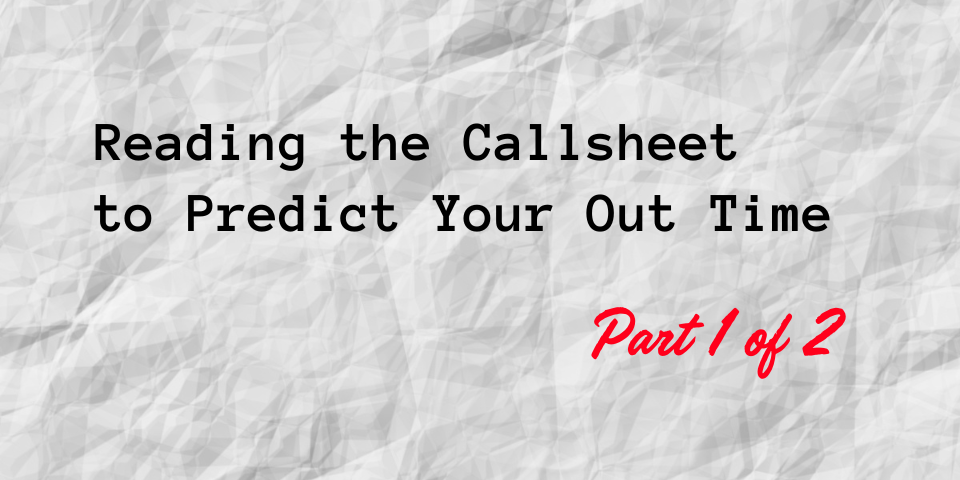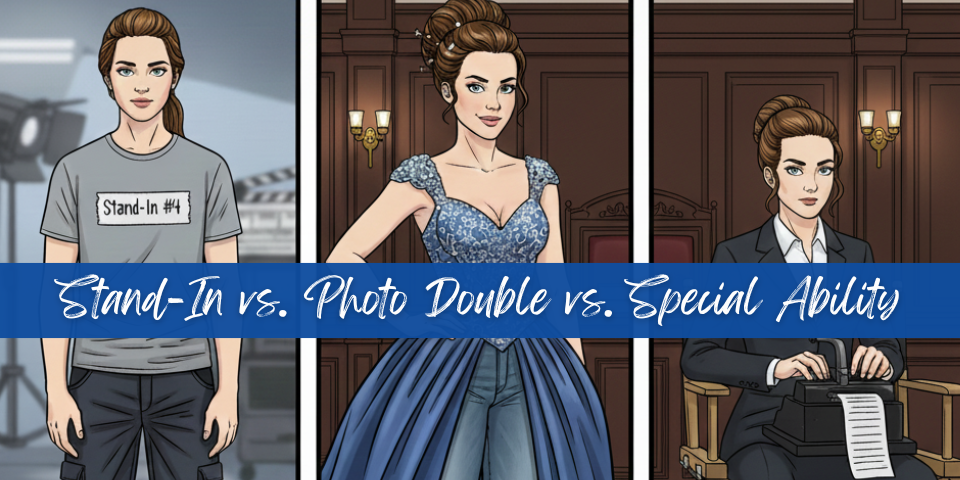If you take the job of the stand-in seriously when you work on a television or film project, and if you find that the production on which you’re working also takes the job seriously, you’ll tend to find that an effective stand-in is valuable to a production and is a serious job.
However, you may come to the conclusion that standing in is not that serious of a job. This conclusion may come from your own low regard for the job, or this conclusion may come from a production’s low regard for the job.
The conclusion may also come from others’ regard for stand-ins, or it may come from a production that doesn’t use stand-ins that much. It may also come from not using stand-ins’ skills and simply employing them for basic, menial tasks like standing in a place rather than also using them to recreate specific blocking and watching monitors for blocking changes.
So how serious is the job of the stand-in? It really depends.
The Job of the Stand-In Can Be Very Serious
It can be a rude awakening the day you show up on a television or film set as a stand-in with an attitude that standing in is not that serious.
Some projects may make you recreate the blocking your actor did in rehearsal, as well as read your actor’s lines and do your actor’s timing exactly. These same projects may have been shooting for some time with the same crew and stand-ins who all take their work seriously. If you can’t perform at their level, you may find the crew gets frustrated with you as they burn valuable production time.
While some directors of photography (DPs) seem to work well without the use of stand-ins, other DPs prefer to light their shots using stand-ins, carefully studying how the light hits their faces — not just from one standing position, but also as the stand-ins move through space in the actors’ rehearsed paths. If you are standing in and you are not in tune with your actor’s exact blocking, you may find that your ignorance may frustrate the DP who is trying to light the shot.
Similarly, a camera crew may depend on you to know your actor’s blocking exactly, and it may set up the shot around your knowledge of your actor’s blocking. If you don’t know what your actor did — or if you make it up — you may frustrate the camera crew who is trying to set up the shot.
This is all to say that if you are working on a production that depends on its stand-ins, and if you come to work as a stand-in not taking the job seriously, you may waste crew members’ and production’s valuable time. If you are looking for future work on the project, you may find you lose your job to another stand-in who takes the job more seriously and protects crew members’ and production’s valuable time.
The Job of the Stand-In Can Be Less than Serious
While there are plenty of productions that depend on the observation skills of their stand-ins, some productions hardly take their stand-ins very seriously and expect very little from them.
You might take your work as a stand-in very seriously and bring to work an array of developed skills and knowledge for doing your stand-in job well. But your production may not demand so much from its stand-ins, which may leave you cynical about the importance of your job.
Truly, some stand-ins show up to jobs and don’t work at all. Some show up and simply stand in one place for a few minutes, and crew members don’t even bother to learn their names. Other stand-ins might show up to work to stand in in a few scenes without much expected of them. And many stand-ins get away with not watching the monitors, meaning they miss blocking changes their actors make — but they experience no repercussions for their ignorance of the blocking changes.
This is not to say that standing in is not a serious job. Clearly, on some productions it is. But, clearly, on some productions it isn’t.
Should I Take Standing in Seriously?
In general, it is better to take the job of standing in seriously when working on a film or television project, until over time it becomes clear that the production doesn’t take standing in as seriously as you do.
So, if you bring all of your knowledge and stand-in skills to work on a production, and if you find that the production really only needs you on occasion to stand in a place without being able to watch rehearsals, and if that pattern keeps up over time, then you might be able to comfortably relax on the seriousness of your stand-in job on this production.
But these kinds of jobs are relatively rare because many times productions will surprise you. You might be standing in on a job for a week, only to find on the next week they really rely on your skills as a stand-in in a particularly challenging scene to shoot. If you prematurely determined the production doesn’t take stand-ins seriously, you might be caught with your pants down when production expects things from you you weren’t ready to deliver to them.
Or a production may not ever have you read lines in a second-team rehearsal, only to surprise you one scene and have your read the lines to time out a scene and to learn where equipment should be placed in light of that timing.
In order to get around being embarrassed as a stand-in for not doing your job, it may help to realize that you are hired and paid to work as a stand-in, so even while a production may not use your skills, it may be in your interest to do your job rather than completely “check out” from the job.
This generally means making yourself available when stand-ins are typically needed, paying attention when you are standing in, watching the monitors when you are excused from standing in, and knowing what is going on when you are on set.
The Effects of Complacent Stand-Ins
When stand-ins “check out,” often they lose track of what is going on on set, they don’t watch the monitors during takes, they get distracted by their mobile phones or conversation when they are standing in, or they don’t show up on set the moment they are needed. Even worse, they are nowhere to be found when they are needed.
Complacent stand-ins like these inevitably put a strain on the AD department. PAs who are already balancing a job may have to call out for or chase down a stand-in. An AD department has to continually mind where a stand-in is or what a stand-in should be doing.
These drains on time and energy are considerable. Contrast these strains with the absence of strain a competent, mindful stand-in provides ADs, and you see how a stand-in who knows what is going on and doing the job is more valuable to the AD department, even on a production that doesn’t use stand-ins much.
Conclusion
Before you draw a conclusion about the seriousness of standing in based on one day’s work as a stand-in or one production’s use of stand-ins, consider that there are more productions out there, with unique demands and different crews, and all of those present different circumstances in which stand-ins work. While some of those productions may use stand-ins without much serious regard, other productions find them critical to the smooth production of a film or television project.
Have any thoughts on the seriousness of stand-in work? Has your stand-in work proven pivotal to a production? Share your experiences below!






Leave A Comment